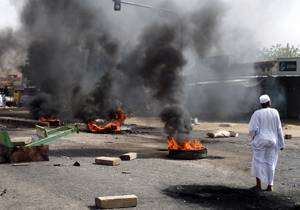
A Sudanese man looks at tires burnt by protesters to close the highway to northern cities amid a wave of unrest over the lifting of fuel subsidies by the Sudanese government.
Khartoum (AP) — Sudanese security forces on Wednesday fired tear gas to disperse dozens of protesters who demonstrated and torched a police station in northern Khartoum, where at least two people have died in three days of rioting over the lifting of fuel subsidies.
Sudan’s loss of its main oil-producing territory with the independence of South Sudan in 2011 was a punch to its fragile economy.
Officials condemned the protests as acts of sabotage, describing them as “premeditated.”
Wednesday’s protests took place in several areas of Kadro district, 15 miles from the capital’s city centre, where protesters blocked roads using lengths of pipe and burning tires. They also attacked a police station.
The riots that began in the state of Gezira, south of Khartoum, have turned into a call for the ouster of President Omar al-Bashir, who has ruled the country for more than two decades. The rioting started after Sudan’s Council of Ministers decided to lift the subsidies, immediately doubling prices of gasoline and fuel.
The semi-official Sudan Media Centre on Wednesday quoted Gezira governor Al-Zubair Bashir Taha as saying that aside from police stations, riots there targeted power and gas stations, banks, shops and private property. Police are tracking down the “saboteurs,” he said.
A day earlier, his deputy, Mohammed al-Kamil Fadallah said the civilians killed in violence in the regional capital of Wad Medani were a student and a bus driver in their early 20s.
The SMC also quoted the deputy head of the Sudanese parliament, Samiya Ahmed Mohammed, as saying she hopes the “opposition understands the measures with objectivity.”
She also criticized the government for not implanting the measures “gradually” and expressed support for peaceful protests but rejected “acts of sabotage” to state institutions.


